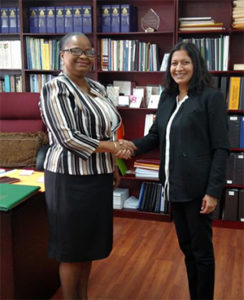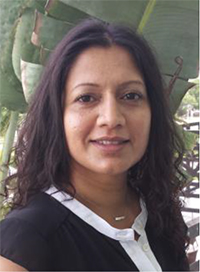Evaluative Case Study of Caregiver Support & Advocacy for Children with Disabilities in Guyana
- admin
- Report by Sharla Madho-Khargi, PhD
After twenty-eight years, I finally returned to Guyana to fulfill one of my life long dreams. This
trip was to begin the process of advocating for and providing support to the disabled population.
Day 1: My trip began at the Community Based Rehabilitation Program (CBR) which is located
in Port Mourant, Berbice, gathering data and conducting assessments to understand and help
parents of disabled people. I met with Mark Adams the program officer for the CBR program
who was extremely helpful in setting up the visit to the program, making introductions to the
teachers and administrators as well as parents who currently participate in the program. I
immediately began administrating surveys to parents, teachers and administrators followed by
parent training skills classes which included American sign language. Parents and teachers were
extremely receptive and thankful. They reported that they felt relieved after the training sessions
because it helped them to understand their children better.
Day 2: Next I visited the Sorsha Williams Foundation in Georgetown Guyana, a program owned
and facilitated by Ms. Karen Williams. Ms. Williams is an amazing human being who puts any
and all efforts necessary to meet the needs of parents of disabled children. This program serves
children with special needs and Autism Spectrum Disorder. Parents who participate in this
program were very receptive to the skills training sessions and were also very thankful for any
help. After my visit at the Sorsha Williams foundation, I did an interview with the Guyana
Times newspaper as well as a television interview via the “Coast to Coast” program facilitated
and hosted by Mr. Nazim Hussain, National coordinating Director of Caribbean Voice. The
newspaper and television interviews were both tremendous in helping to raise awareness and
create advocacy for the disabled population.

Day 3: On day three of my trip, I met with Hon. Volda Lawrence, Minister of Public Health (pictured on left). , The meeting was facilitated by Indian Diaspora Council president Mr. Ashook Ramsaran. My meeting with the Min. Lawrence was a success as Min. Lawrence and her staff were welcoming and respectful of the objectives of my trip. They were kind enough to listen to my assessment of the CBR program and offered to help with the project by putting me in contact with the staff of the Disability Council in Guyana. On the same day, I reviewed the Ptolemy Reid Program, also in Georgetown which serves children with disabilities. The staff at the Ptolemy Reid program were hungry for knowledge and resources to better help them to serve the disabled population.
Days 4-5: In days four and five I followed up with more training sessions at the CBR program as
well as conducting one to one house visits with families of disabled children. Visiting families on
a one to one basis left a profound impact on me and the extent of work that needs to be done to
improve this disabled population in Guyana.
My brief five-day trip was productive, inspiring and rewarding. It helped to keep alive my
passion as a psychologist and philanthropist who will continue to empower parents of disabled
children and influence positive social change and social justice. My observations and
interactions with families, programs, teachers and administrators provided an in depth
understanding of the real-life condition of these facilities. There was no running water and
barely functional furniture. I am even more disturbed at the limited resources available to the
disabled population. It is appalling that teachers at the CBR program use beer bottle caps as
counting tools, outdated and inappropriate books that do not address the appropriate cognitive
level of functioning of the students. There was no running water and the furniture was barely
functional. Despite all these conditions, the teachers worked diligently with what was available
to provide an education to their students.
All of these programs are in dire need of education, awareness, nurture, advocacy and resources
to support and sustain appropriate care for the disabled population. It is highly unethical that the
amendments that were put in place by the Convention on the Rights for People with Disabilities
in 2006 has not been distributed to every parent of a disabled child, facilities that struggle to
support this population, teachers, administrators and representative who are in the position to
advocate appropriately for the disabled population.
My Conclusions
- Parents are unaware of the amendments that were put in place by the 2006 Convention on the Rights for People with Disabilities.
- The needs of the disabled population are minimized.
- Parents of disabled people are in need of education, advocacy and resources to understand and help their disabled children.
- The CBR program is in need of school supplies, furniture and additional educations resources to continue to teach the students of the program.
- The CBR program needs to be restructured to appropriately serve the needs of disabled children as well as their parents.
- Rebuild and restructure the CBR program.
- Provide resources to maintain the CBR program.
- Provide consistent and ongoing skills training to parents of disabled children.
- Provide and train professionals to sustain the growth of the CBR program.
Dr. Sharla Madho-Khargi, Indian Diaspora Council’s Director of Community Based Rehabilitation, is a clinical psychologist based in New York. She is an assistant director for one of NY State’s Psychiatric Institute’s QSAC – Quality Service for the Autistic Community, as well as an adjunct professor at the City University of New York. She is currently working internationally to raise more awareness and build advocacy for disabled people. Her research focuses on improving the lives of disabled people across the world and effecting positive social change.


